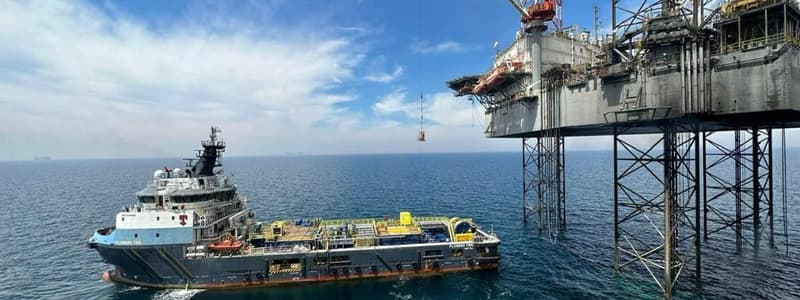Podcast
Questions and Answers
How Long has NOC been operating in Al Shaheen
How Long has NOC been operating in Al Shaheen
- Since 2020
- Since 2019
- Since 2017 (correct)
- Since 2015
What are the two types of wells in NOC?
What are the two types of wells in NOC?
- Producers and Injectors (correct)
- Operators and producers
- Injectors only
- Operators only
How much does NOC produce each day?
How much does NOC produce each day?
- 2 Million BOPD
- 1 Million BOPD
- 500,000 BOPD
- 300,000 BOPD (correct)
What is the primary goal of drilling engineers?
What is the primary goal of drilling engineers?
Which Rig Up did we see in the video?
Which Rig Up did we see in the video?
What topics did we cover today?
What topics did we cover today?
What stimulation do we do in NOC?
What stimulation do we do in NOC?
Which discipline in oil and gas industry gained popularity from Macondo Gulf of Mexico?
Which discipline in oil and gas industry gained popularity from Macondo Gulf of Mexico?
What is the main reason of integrity failures
What is the main reason of integrity failures
What is the movie that you will watch this weekend?
What is the movie that you will watch this weekend?
What is the main golden rule of Well integrity in NOC.
What is the main golden rule of Well integrity in NOC.
SSSV valve was introduced to prevent any collision or explosion.
SSSV valve was introduced to prevent any collision or explosion.
All wells have a gas lift valve
All wells have a gas lift valve
Flashcards are hidden until you start studying
Study Notes
Unraveling the World of Oil and Gas: A Deep Dive into Reservoir Engineering, Petroleum Geology, and Drilling
Oil and gas form an essential part of our global energy landscape. As we delve into the fascinating world of this critical resource, we'll explore three fundamental subtopics: reservoir engineering, petroleum geology, and drilling. Each discipline is essential to the efficient and sustainable exploration and production of oil and gas.
1. Reservoir Engineering
Reservoir engineering is a multidisciplinary field that focuses on the optimization of oil and gas recovery from subsurface reservoirs. It's a complex blend of geology, chemistry, and physics, where engineers work closely with geologists and petrophysicists to maximize the recovery of hydrocarbons.
Reservoir engineers strive to improve the efficiency of oil and gas production processes by developing an in-depth understanding of reservoir properties, such as porosity, permeability, and saturation. They design, implement, and monitor various techniques to enhance recovery, including waterflooding, gas injection, and chemical flooding.
Reservoir engineers also analyze data collected from well tests, production logs, and seismic studies to make informed decisions about the best way to optimize and maintain the reservoir's performance. By using advanced software and simulation tools, they can model the behavior of fluids in reservoirs and predict the most effective methods to extract hydrocarbons.
2. Petroleum Geology
Petroleum geology is the branch of geology that deals with the location, distribution, and exploitation of oil and gas resources. These geologists use their understanding of the earth's geological history, geophysics, and geochemistry to identify and characterize promising locations for drilling operations.
Petroleum geologists employ a variety of geophysical techniques to map subsurface geological features, including seismic reflection, gravity, and magnetic surveys. They also analyze core samples, well logs, and rock properties to determine the porosity, permeability, and mineralogy of reservoir rocks.
Once a promising area has been identified, petroleum geologists work closely with reservoir engineers and drilling crews to design wells that can efficiently extract oil and gas from the subsurface. They also assess the potential environmental impact of drilling projects and provide recommendations for mitigating any negative effects.
3. Drilling
Drilling is the process of creating a well to access oil and gas resources in subsurface reservoirs. The drilling process involves creating a borehole, installing casing, and perforating the reservoir rock to allow fluids to flow to the surface.
Drilling crews use a variety of techniques to create wells, including rotary drilling, directional drilling, and horizontal drilling. They employ specialized drilling rigs, tools, and equipment to create wells that can efficiently extract oil and gas from the subsurface.
Drilling engineers work closely with geologists, geophysicists, and reservoir engineers to design wells that can efficiently extract oil and gas from subsurface reservoirs. They develop drilling programs that minimize the environmental impact and maximize the recovery of hydrocarbons.
Conclusion
The interdisciplinary nature of the oil and gas industry is a testament to the significant challenges faced by those working to extract and produce hydrocarbons. By combining their expertise, geologists, petroleum engineers, and drilling engineers can develop innovative solutions to complex problems, ensuring a sustainable and efficient supply of oil and gas for generations to come.
Through innovative research and best practices, our understanding of reservoir engineering, petroleum geology, and drilling continues to evolve, leading to improved efficiency and sustainability in the oil and gas industry. As we move forward, we must continue to work together to find new ways to extract and produce hydrocarbons while minimizing our environmental impact.
Studying That Suits You
Use AI to generate personalized quizzes and flashcards to suit your learning preferences.




